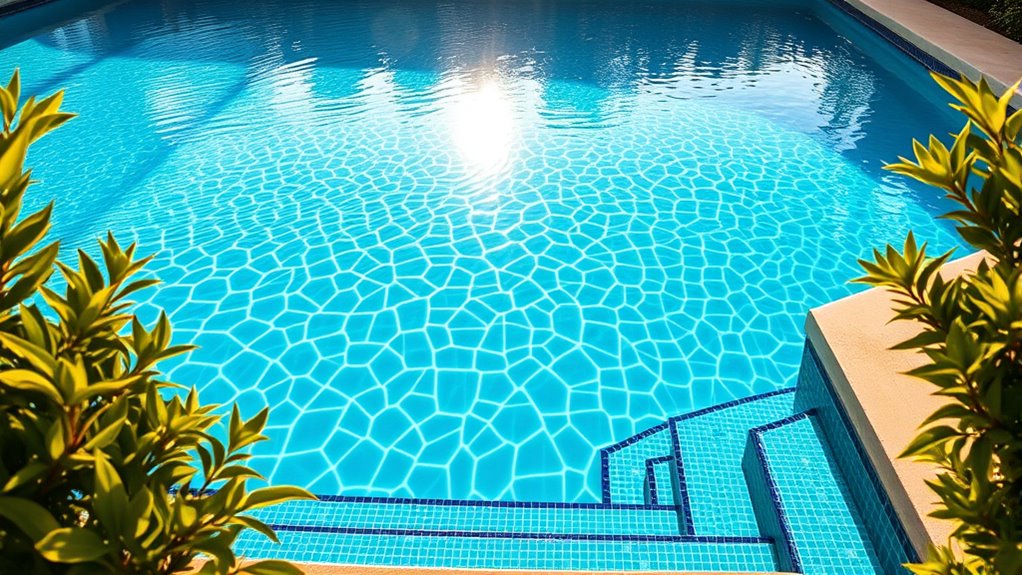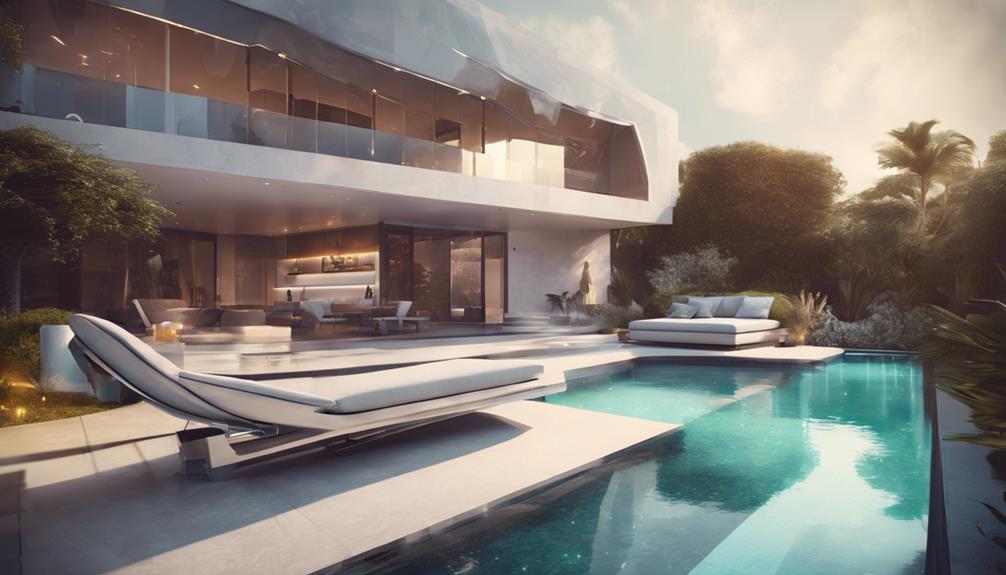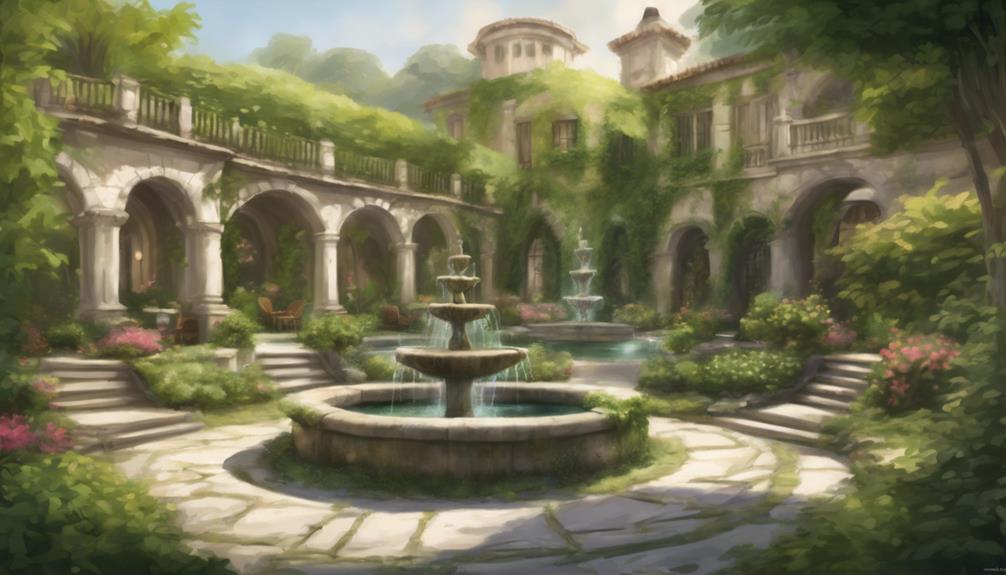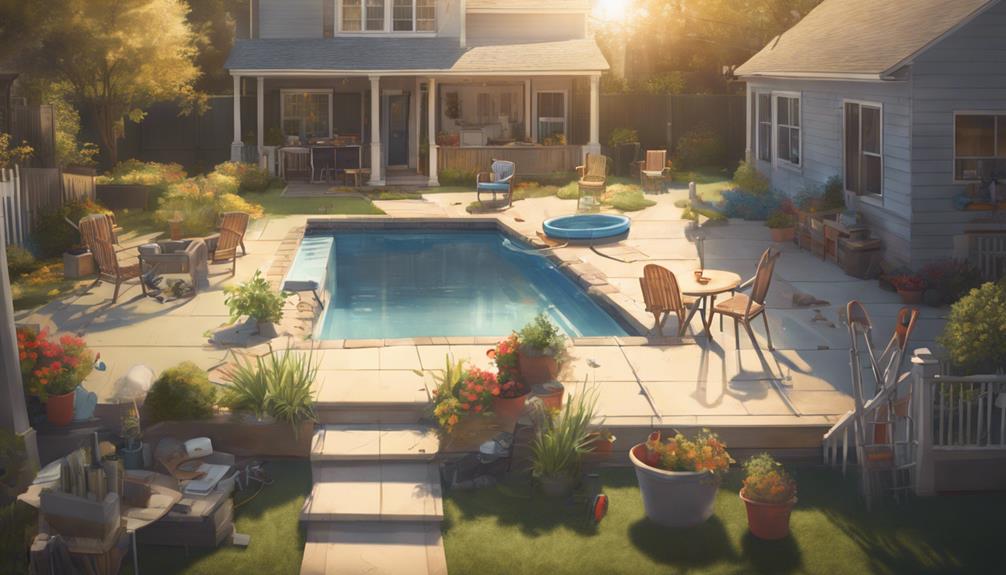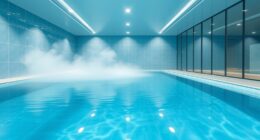The ideal depth for your home swimming pool depends on your intended activities and safety needs. Generally, you’ll want a shallow area of about 3 to 4 feet for lounging and children, while deeper zones of 6 to 9 feet suit swimming and diving. Balancing these zones guarantees safety and functionality. To make the most of your space, understanding the best options for your backyard is key—stay with us to discover more.
Key Takeaways
- Shallow zones of 3 to 4 feet are ideal for safety and children’s play areas.
- Deep sections of 6 to 9 feet accommodate adult swimming and diving activities.
- Minimum 8 to 9 feet depth is required for safe diving boards and diving zones.
- Multi-depth pools combine shallow lounging areas with deeper zones for versatility.
- Safety regulations and intended use should guide the overall pool depth design.

When planning a home swimming pool, one of the most important decisions is how deep it should be. The depth you choose directly impacts pool safety, overall design considerations, and how you’ll enjoy the space. To start, consider who will be using the pool most often. If children or inexperienced swimmers will be in the water, a shallower area—around 3 to 4 feet—ensures safety and reduces the risk of accidents. For adult swimmers or those interested in diving, deeper zones are necessary, typically ranging from 6 to 9 feet, or even more for diving boards. Balancing safety and functionality is key here; you want a space that’s safe but also versatile enough for different activities.
When thinking about pool safety, depth plays a vital role. Shallow areas minimize drowning risks, especially for kids or less confident swimmers. Incorporate features like gradual slopes or designated shallow zones to create a safer environment. If you’re considering a diving board, make sure the depth meets local safety regulations, often requiring at least 8 to 9 feet of water to prevent injuries. Additionally, clear signage and barriers can help reinforce safety rules. You should also pay attention to design considerations: the depth influences the overall shape of your pool and how it integrates with your yard. For example, a multi-depth pool can provide a shallow lounging area and a deeper zone for swimming laps or diving, maximizing space and functionality.
The choice of depth also affects the aesthetics and maintenance of your pool. Shallow areas tend to be easier to clean and maintain, while deeper sections might require more diligent care to manage water quality and circulation. Furthermore, the pool’s depth can influence the type of features you add, such as waterfalls or built-in seating, which often work better in shallower zones. When planning your pool, think about how the depth aligns with your landscape and outdoor design. A well-designed pool that considers safety, usability, and visual appeal will enhance your backyard and provide years of enjoyment.
Ultimately, determining the right depth is about understanding your needs and priorities. Prioritize safety and functionality, but also consider how the depth will impact the overall design and your experience. Consulting with a professional pool builder can help you identify the best options for your space, ensuring your pool is both safe and beautiful for everyone who uses it.
Frequently Asked Questions
Can Pool Depth Affect Water Temperature Retention?
Yes, pool depth can affect water temperature retention. A deeper pool retains heat better because it minimizes heat loss from surface evaporation. Proper water circulation, combined with solar heating, enhances temperature stability by evenly distributing warm water. If your pool is shallow, it might lose heat faster, especially during windy or cloudy days. So, a deeper pool with good circulation helps maintain a comfortable, warm swimming environment longer.
What Are the Safety Risks of Deeper Pools?
Deeper pools pose safety risks like increased chances of diving accidents and injuries. You should be cautious about diving safety, especially if your pool lacks proper depth markers or shallow zones. Without designated shallow areas, swimmers might misjudge their ability to dive or jump safely, leading to serious injuries. Always enforce rules, install safety features, and make certain that diving is only permitted where the pool depth is appropriate.
How Does Pool Depth Impact Maintenance Requirements?
Deeper pools require more maintenance because they demand more frequent pool cleaning to remove debris and algae at greater depths. You’ll also need to monitor and balance the chemical levels carefully, as larger water volumes can affect water quality. Additionally, maintaining the filtration system is more challenging, and you might need specialized equipment, making overall pool maintenance more time-consuming and costly compared to shallower pools.
Are Deeper Pools More Expensive to Install?
Deeper pools cost more to install, require more material, and face increased installation challenges. You’ll need stronger structural support, advanced excavation techniques, and potentially higher engineering costs. These cost considerations don’t end at construction; maintenance and heating also rise with depth. So, if you’re planning your pool, be prepared for higher upfront expenses and ongoing costs associated with a deeper design.
What Are the Local Building Code Restrictions on Pool Depth?
You need to check your local building codes and zoning regulations before pool construction. These rules often specify maximum and minimum depths, safety features, and fencing requirements. Contact your city or county building department for precise restrictions in your area. Ensuring your pool complies with these regulations helps avoid fines or reconstruction, while also keeping your family safe during swimming activities. Always prioritize adhering to local guidelines during planning and installation.
Conclusion
Ultimately, choosing the right depth for your pool is about finding the sweet spot where fun and safety gently meet. Think of it as creating a private oasis that invites you to relax and enjoy without worry. By considering your favorite activities and comfort level, you’ll craft a space that feels just right—like a hidden treasure waiting to be discovered. Trust your instincts, and your perfect backyard retreat will flow effortlessly into your life.

